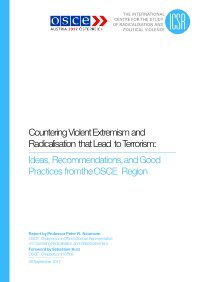Countering Violent Extremism and Radicalisation that Lead to Terrorism: Ideas, Recommendations, and Good Practices from the OSCE Region
By Peter Neumann.
There is practically no country in the OSCE that has not been affected by violent extremism. In 2016, terrorist attacks in OSCE participating States caused more than one thousand deaths. They destroyed billions of Euros worth of property and infrastructure, undermined people’s confidence in government and institutions, and created fear and suspicion between members of different ethnic and religious communities. Violent extremists not only cause death and destruction, they poison societies with hateful ideologies, and hinder peaceful development, dialogue, and cooperation. OSCE participating States have long recognised this challenge. • It was in this context that the Austrian Chairmanship asked me to serve as Special Representative on Countering Violent Extremism and Radicalisation. My task was to sharpen the organisation’s focus, highlight existing activities, and offer practical suggestions for enhanced collaboration. The aim was to enable the OSCE to make the strongest possible contribution to what it calls Countering Violent Extremism and Radicalisation that Lead to Terrorism (VERLT), and fulfil the mandate it was given in the 2012 Consolidated Framework as well as Ministerial Declarations from 2015 and 2016. • This report provides a summary of my findings. It seeks to (1) define key concepts and major dynamics; (2) evaluate the OSCE’s current and future role; and (3) identify areas of good practice, with particular emphasis on preventing and countering processes of violent radicalisation.
London: ICSR, King's College London, 2017. 68p.


